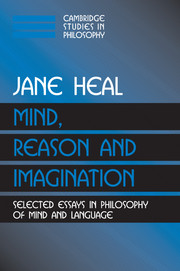Book contents
- Frontmatter
- Contents
- Preface
- Sources
- Mind, Reason and Imagination
- 1 Introduction
- PART I MIND, THEORY AND IMAGINATION
- PART II THOUGHT AND REASON
- 6 Co-Cognition and Off-Line Simulation: Two Ways of Understanding the Simulation Approach
- 7 Semantic Holism: Still a Good Buy
- 8 Other Minds, Rationality and Analogy
- PART III INDEXICAL PREDICATES AND THEIR APPLICATIONS
- PART IV THINKING OF MINDS AND INTERACTING WITH PERSONS
- References
- Index
6 - Co-Cognition and Off-Line Simulation: Two Ways of Understanding the Simulation Approach
Published online by Cambridge University Press: 18 December 2009
- Frontmatter
- Contents
- Preface
- Sources
- Mind, Reason and Imagination
- 1 Introduction
- PART I MIND, THEORY AND IMAGINATION
- PART II THOUGHT AND REASON
- 6 Co-Cognition and Off-Line Simulation: Two Ways of Understanding the Simulation Approach
- 7 Semantic Holism: Still a Good Buy
- 8 Other Minds, Rationality and Analogy
- PART III INDEXICAL PREDICATES AND THEIR APPLICATIONS
- PART IV THINKING OF MINDS AND INTERACTING WITH PERSONS
- References
- Index
Summary
INTRODUCTION
The central aim of this essay is to articulate and recommend the idea that the simulationist view about what is involved in grasp and use of psychological concepts may be understood in two different ways, namely as an a priori claim about the relations of certain personal-level cognitive abilities or as an a posteriori hypothesis about the workings of sub-personal cognitive machinery. I hope also to show that this contrast has important implications for the simulation debate in general, in that it suggests there is a potentially serious confusion lurking in the way the ‘theory versus simulation’ question is often posed and discussed. The stimulus for the attempt to clarify these matters has been the desire to respond to some of the points made in a recent paper by Stich and Nichols (1997), which is in turn a response to an earlier paper of mine (this volume, Essay 5). So, in the final sections of this essay, 1 shall comment briefly on some aspects of this exchange. But one major issue raised there, namely the role of (some notion of) rationality in defining the domain of simulation, is not fully considered here. I seek rather to provide the context in which a more adequate discussion of that topic might occur.
Put slightly more fully, my central suggestion is this.
- Type
- Chapter
- Information
- Mind, Reason and ImaginationSelected Essays in Philosophy of Mind and Language, pp. 91 - 114Publisher: Cambridge University PressPrint publication year: 2003
- 2
- Cited by



